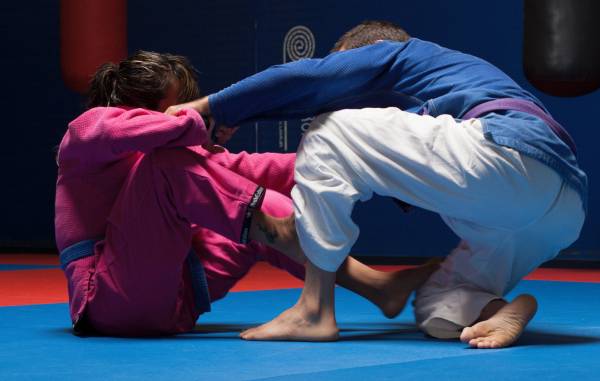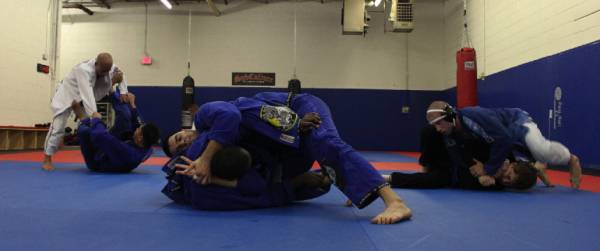A few months ago I was waiting in line at my local public library. (Yep, I still go to the library. I love the library.) There was a fairly long line, maybe five or six people besides me, because the automated checkout machines were on the fritz. We all waited patiently while the librarians on duty processed our transactions.
Just as I got to the front of the line and was being beckoned by the next available librarian, an older female patron walked in the door and immediately to that librarian, cutting in front of me and the rest of the people in line.
“Excuse me,” I said to her. “There is a line.” And I pointed behind me.
“Oh, I don’t need to check anything out,” the woman said. “I just need to ask a question.”
“I’m sure someone can help you once you get to the front of the line.” I again pointed behind me.
“But I just need to ask a question,” she repeated.
“Line,” I repeated and re-pointed.
The flustered patron looked at the librarian, who shrugged and smiled, understandably not wanting to get in the middle of things. By this time, I had walked up to both of them and placed myself between the patron and the librarian so I could get my transaction done.
“But–”
“Ma’am, everyone has to wait in line. That’s what the rest of us have been doing since before you got here.”
The patron stared daggers at me, but by God, she went to the end of the line. And the rest of the members of that line shot me non-verbal atta-girls – thumbs-ups and smiles – when she wasn’t looking.

The Basis of Entitlement
For whatever reason, this patron had decided she was entitled to cut in front of everyone else. And she’s not alone. I see people over-exercising their entitlement muscles all the time. Sometimes they are justified, but all too often there seems to be some kind of mental gymnastics going on such that people decide they deserve special treatment for a reason known only to them.
“When we try to entitle ourselves to things we are not actually entitled to, we communicate to others that we are better than they are, whether in jiu jitsu or otherwise.”
I think of entitlement as the belief that I deserve something though I haven’t actually earned it and/or though common sense, hard evidence, or convention dictates otherwise. The library patron felt entitled to speak to the librarian, but by trying to jump the line, she had not yet earned the right. She tried to circumvent the convention of line standing, which no one particularly loves, but which we know is a requirement of living in polite society.
Entitlement in BJJ
Unfortunately, random acts of entitlement happen in Brazilian jiu jitsu just as in other walks of life. Those of us who are further up the grappling totem pole do deserve some acknowledgement of the time and effort it took to make the climb. Due to this effort, jiu jitsu black belts and other higher-belt leaders are entitled to certain benefits within the realm of jiu jitsu.
These benefits may vary from academy to academy, but here are a few common ones:
- The same respect that would be afforded any leader in the context in which that leader has demonstrated experience and skill
- First selection of partners
- Lower belts moving out of the way if two pairs run into each other during live training
There are others, but you get the idea. However, some black/higher belts assume that our rank entitles us to treatment and benefits that have nothing to do with BJJ. Some of us have somehow concluded that when we outrank others, as grapplers, it means we outrank them in general, as people.

I use the first person plural because I know I have been guilty of unwarranted entitlement before and, unfortunately, despite my efforts to police myself, will probably be guilty of it again. Some entitlement behavior lies toward the benign end of the spectrum, like expecting that someone else will always drive if a group is going somewhere. This is a bit self-centered, but not overtly harmful. Other expectations, though, represent more nefarious boundary violations.
Entitlement Is a Slippery Slope
It can be a slippery slope, particularly for those of us who spend most of our time with jiu jitsu people even when we are not training. We may socialize with other grapplers, and it can be difficult to draw a clear line between situations where a jiu jitsu hierarchy is appropriate and where real life enters the picture. Traveling with teammates to a competition is a good example of this, as it mixes jiu jitsu-related situations, such as the coach shouting commands to the competing athlete, with more everyday ones, such as deciding who gets to choose the restaurant.
“I think of entitlement as the belief that I deserve something though I haven’t actually earned it and/or though common sense, hard evidence, or convention dictates otherwise.”
But the fact that the line can be blurry does not absolve us of the responsibility to do all we can, all the time, to clarify and respect it. A hierarchy that is justifiable in the context of jiu jitsu has no automatic bearing on our rights and entitlements in the rest of the world. If we want entitlements “out there,” we must earn them in corresponding ways, and I’m willing to bet most of these ways have nothing to do with how good we are at attacks from [insert name of your favorite guard].
In fact, here is what our black belts entitle us to in non-jiu jitsu situations:
- Nothing
- Zilch
- Zip
We are not black belts in everything. Our expertise and that to which we are even remotely entitled are confined to a relatively small subset of all possible life experiences. Though jiu jitsu may take up most of our time and attention, the majority of people in the world probably couldn’t give less of a crap about our sick kneebar or our superhuman grip strength. Off the mat, we have to stand in line, just like everyone else.

You Are Not a Black Belt in Everything
Why am I bringing this up? Because as a black belt, I take seriously what I see as a responsibility to steward the best that jiu jitsu has to offer. When we try to entitle ourselves to things we are not actually entitled to, we communicate to others that we are better than they are, whether in jiu jitsu or otherwise.
And I do not want to send this message. I am not in any way suggesting we coddle lower belts or enable inappropriate behavior on their part. The only thing more annoying than a black belt with an oversized sense of entitlement is a lower belt with one. But as black belts, we can set the tone and create a good model for others to follow.
What are your thoughts about entitlement in jiu jitsu, both among the leadership and the up-and-coming? Is it a big problem, or am I overreacting? Join me in the forums with your thoughts.
Check out these related articles:
- 7 Things I Have Learned About BJJ From Joe Rogan
- The Trials and Trade-Offs of Being a Competitive Athlete
- Tough Lessons From My Teacher – Learning to Value Our Learning
- What’s New On Breaking Muscle Today?
Photos 1 and 2 courtesy of Shutterstock.
Photos 3 and 4 coutesy of Ana Nieves.






